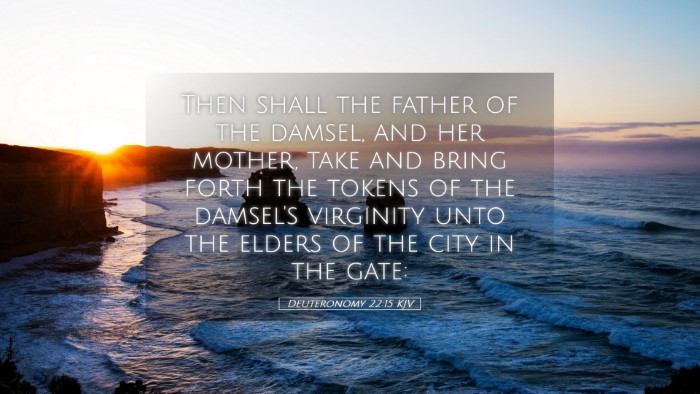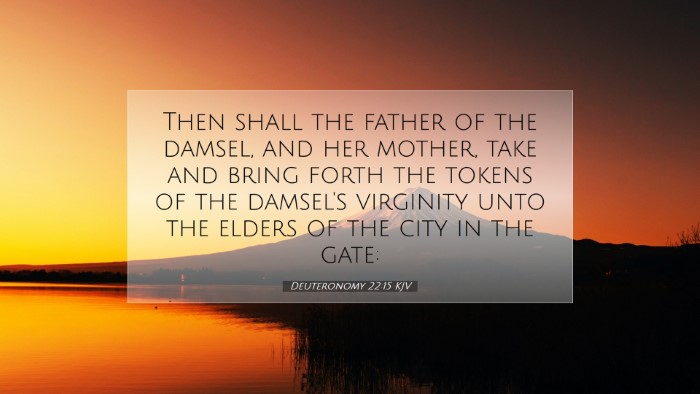Commentary on Deuteronomy 22:15
Verse Text: "Then shall the father of the damsel, and her mother, take and bring forth the tokens of the damsel’s virginity unto the elders of the city in the gate."
Introduction
Deuteronomy 22:15 is part of a larger section within the book of Deuteronomy where various laws regarding social justice, sexual morality, and family integrity are outlined. This verse highlights the importance of marital fidelity and the value placed on virginity in ancient Israelite society.
Contextual Background
This law was instituted during a time when patriarchal values shaped societal norms. Understanding the cultural and religious frameworks within which these laws were delivered is essential for contemporary application. The parents of the young woman were tasked with providing proof of her virginity, thereby protecting her honor and ensuring just treatment within the community.
Interpretation and Commentary
Matthew Henry's Insight
Matthew Henry emphasizes the seriousness of the matter involving the preservation of virginity in the societal context of Israel. He articulates that the demand for proof of virginity was not merely legalistic but served to uphold the dignity of the woman and her family. In a society where honor was intertwined with familial reputation, such laws were critical in defining moral boundaries.
Albert Barnes’ Observation
Albert Barnes highlights the legal procedure involved in this case. He points out that the parents, having a vested interest in the daughter's protection, were to present tangible evidence before the city elders. Barnes argues that this not only served to clarify allegations but also sought to maintain justice and integrity within the community. His commentary points toward the relational dynamics at work: the interplay between individual actions and communal consequences.
Adam Clarke's Perspective
Adam Clarke approaches the verse with an emphasis on the gravity of falsely accusing a woman. He underscores that the law was intended to prevent slanderous accusations against women, showcasing God's desire for justice. Clarke posits that this reflects God's commitment to justice and fair treatment, ensuring that the innocent were protected from wrongful condemnation.
Theological Implications
From a theological standpoint, this verse underscores several critical principles:
- The Sanctity of Marriage: The emphasis on virginity points to the sacredness of the marriage covenant and the integrity expected within it.
- Justice and Fairness: The process prescribed reflects God's concern for justice, illustrating that accusations must be substantiated to protect individuals' reputations.
- Community Responsibility: The involvement of parents and elders indicates that spiritual and moral health of the community is a collective responsibility.
Application for Today
Pastors, students, and scholars can draw valuable lessons from Deuteronomy 22:15. When applied to contemporary settings, the passage underscores the need for accountability and integrity. Here are some key applications:
- Promoting Integrity: There is a need for individuals to uphold personal integrity and virtue in their lives and communities.
- Addressing Slander: The church should create environments where accusations are handled with care and respect for truth, discouraging gossip and malicious behavior.
- Supporting Families: Encouraging families to instill values of honor and fidelity in their children remains as relevant today as in ancient Israel.
Conclusion
Deuteronomy 22:15 invites an examination of issues surrounding honor, truth, and community dynamics. Those engaging with Scripture are reminded of God’s demand for justice and the serious implications of personal conduct on communal life. As we reflect on this passage, we are called to cultivate a culture of accountability, respect, and love that speaks to the holistic design of God’s intended order for society.


